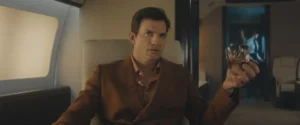Summary
Based on a memoir, Netflix Film Brain on Fire offers a terrifying insight of Susannah Cahalan who was regularly misdiagnosed.
Netflix film Brain on Fire offers a solid collection of events that paint the picture of a regressive rare disease. We follow Susannah Cahalan, a young up and coming journalist working at the New York Post who starts to experience a range of symptoms that affect the way she thinks and feels.
It is worth noting that Brain on Fire is based on a memoir and the title is literal. I felt a little irritated with myself midway through the film when I started trying to figure out the medical mystery. The film is called Brain on Fire so there is little point in trying to become Dr House. The Netflix film solely relies on the perceptions of Susannah Cahalan, played by Chloë Grace Moretz, who does a standard job of playing a character that is slowly losing herself.
Generally, Brain on Fire articulates the regressiveness of a brain disease and shouts to the audience the spiralling paranoia that comes with it. Her friends, family and peers, for the most part, are a backdrop to the character’s life, seemingly frustrated by the actions of Susannah. Her supporting characters are there but obscure to the story, which is absolutely fine because keeping them indistinct helps form the narrative.

The problem is the majority of the film could be mistaken for a drug-fueled trippy adventure played by a hardworking and stressed journalist. You understand immediately that what is happening to Susannah is not her fault and her wellbeing is truly under attack by something completely unknown. Once Brain on Fire demonstrates the horrors of what she is going through a few times, you get it. The movie takes far too long introducing those who are concerned. When her family start dealing with the medical mystery the film begins to develop because it is not just showing us how well Chloë Grace Moretz can act dazed and trippy.
When Brain on Fire finally stops showing Susannah’s life breaking down by no fault of her own and the doctors get involved, you finally feel engaged. Have you ever been to your local GP to be regularly dismissed of your symptoms? Not only is the entire experience frustrating but it drains you of your energy, and when the symptoms continue, it makes you more doubtful of the system. Brain on Fire can be honoured for unveiling the fact-based approach of the medical world and their willingness to pass the buck if the tests reveal nothing.
Brain on Fire is a 90-minute well-constructed awareness piece, signifying a rare disease but also highlighting the trend of a missed diagnosis. Apart from the intrigue of understanding what is wrong with Susannah Cahalan, there is no added substance that makes this film stand out. Brain on Fire is fairly forgettable. The memoir, however, sounds appealing, so it may be worth looking into that.




